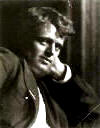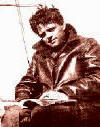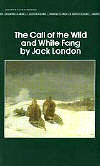|
Jack London
 January
12 marks the birthday of writer Jack London. Born John Griffith Chaney
in San Francisco in 1876, the prolific author and journalist is best known for
his novels, The Call of the Wild (1903) and White Fang (1906).
An illegitimate child, London was deserted by his father, "Professor" William
Henry Chaney, an itinerant astrologer who denied paternity and abandoned the
family before young John's first birthday.
John's mother, Flora Wellman, a music teacher
and spiritualist, gave him to a wet nurse, Daphna Virginia [“Jennie”]
Prentiss, to raise. January
12 marks the birthday of writer Jack London. Born John Griffith Chaney
in San Francisco in 1876, the prolific author and journalist is best known for
his novels, The Call of the Wild (1903) and White Fang (1906).
An illegitimate child, London was deserted by his father, "Professor" William
Henry Chaney, an itinerant astrologer who denied paternity and abandoned the
family before young John's first birthday.
John's mother, Flora Wellman, a music teacher
and spiritualist, gave him to a wet nurse, Daphna Virginia [“Jennie”]
Prentiss, to raise.
On September 7, Wellman married widower John
London, a failed storekeeper; and the child was returned to the family
household, where he acquired his stepfather's surname, “London.” As a youth, London
was engulfed in poverty. By the age of
10, he had already become an avid reader. He borrowed books from the
Oakland Public Library, where he was introduced to the works of Flaubert, Tolstoy,
and other major novelists. After leaving grade school in 1889 at the age of 14,
he
grew increasingly socialistic in his views, protesting the government's
policies leading to high unemployment. He decided against going to
high school and took a job at a cannery, where he worked long and hard for
as many as 18 - 20 hours a day. Desperate for a better life, he
borrowed money from his "stepmother," Jennie Prentiss, to buy a sloop named
Razzle-Dazzle from a notorious oyster pirate named French Frank.
The sloop came complete with its own mistress, Mamie, known as the Queen of
the Oyster Pirates. Frank was in love with her, although the feelings
were unrequited. During the lavish shipside drinking bout that
accompanied the sloop's sale, Mamie followed London topside where the two
made love.
Here, in this atmosphere of bohemianism, I could not but contrast the
scene with my scene of the day before, sitting at my machine, in the
stifling, shut-in air, repeating, endlessly repeating, at top speed, my
series of mechanical motions. And here I sat now, glass in hand, in
warm-glowing camaraderie, with the oyster pirates, adventurers who refused
to be slaves to petty routine, who flouted restrictions and the law, who
carried their lives and their liberty in their hands. And it was
through John Barleycorn that I came to join this glorious company of free
souls, unashamed and unafraid. - from John Barleycorn, 1913
Before long, London was raiding oyster beds and selling the mollusks to
the local fish markets. He became so adept at the game that the locals
called him the "Prince of the Oyster Pirates." He made more money in
one week of pirating than he earned in his first full year as a professional
writer. When his sloop finally became too ragged to sail, he switched
allegiances and became a warden for the California Fish Patrol.
 At
the age of 17, London signed onto a sealing ship bound for exotic
ports-of-call. The turning point of his life came when he was forced
to spend 30 days in the brig, an experience so humiliating and degrading that it forced him to reevaluate his
career choices. He decided to become a writer. At
the age of 17, London signed onto a sealing ship bound for exotic
ports-of-call. The turning point of his life came when he was forced
to spend 30 days in the brig, an experience so humiliating and degrading that it forced him to reevaluate his
career choices. He decided to become a writer.
But his newly found career was put on hold when, after returning to the States, he was arrested in and
jailed for vagrancy in Niagara Falls. That made him more determined than ever to raise himself
up out of poverty. His experiences would later provide material for works such as The
Sea Wolf (1904), which was partly based on his horrifying experiences as a
sailor in the Pacific Ocean, and The Road (1907), a collection of
short stories that inspired later writers like John Steinbeck and Jack Kerouac.
London eventually returned to high school and gained
admittance to the University of California at Berkeley. He stayed for
only six months, though, calling it "not alive enough" and a "passionless pursuit of
passionless intelligence." In 1897, scrounging around
for a way to make money, he went to Alaska to
pan for gold. He never found any, but he gained a tremendous amount of
insight and perspective. Suffering from scurby, he returned to Oakland two years later and
continued to struggle in poverty, writing day and night.
 In
1900, London married Elisabeth (Bess) Maddern, and their home became an
overnight
battlefield for Bess and London's mother, Flora. Three years later,
he left his wife and their two daughters and eventually married Charmian Kittredge,
an editor and outdoorswoman. The marriage lasted until London's death.
Charmian became the model of nearly all of London's female characters, such as Paula in
The Little Lady of the Big House (1916). In
1900, London married Elisabeth (Bess) Maddern, and their home became an
overnight
battlefield for Bess and London's mother, Flora. Three years later,
he left his wife and their two daughters and eventually married Charmian Kittredge,
an editor and outdoorswoman. The marriage lasted until London's death.
Charmian became the model of nearly all of London's female characters, such as Paula in
The Little Lady of the Big House (1916).
In 1901, London ran unsuccessfully on the Socialist party
ticket for the position of mayor of Oakland. He continued cranking out novels, nonfiction, and
short stories, becoming in his lifetime one of the most popular authors.
He built his productivity on a system of writing a thousand words a day. He stuck to this quota even during his travels and
through his drinking periods. His first novel, The Son of the Wolf,
appeared in 1900. By 1904, he had published ten books. Son of
the Wolf was widely received and cemented London's role as an important
literary figure. His other tales of Alaska, The Call
of the Wild (1903), in which a giant pet dog finds his survival
instincts in the Yukon, White Fang (1906), and Burning Daylight
(1910) were also immensely popular.
"There is an ecstasy that marks the summit of life, and
beyond which life cannot rise. And such is the paradox of living, this
ecstasy comes when one is most alive, and it comes as a complete
forgetfulness that one is alive. This ecstasy, this forgetfulness of living,
comes to the artist, caught up and out of himself in a sheet of flame; it
comes to the soldier, war-mad on a stricken field and refusing quarter; and
it came to Buck leading the pack, sounding the old wolf-cry, straining after
the food that was alive and that fled swiftly before him through the
moonlight." - from The Call of the Wild
 At
his peak, London enjoyed the title of America's most famous and best-selling author and
the first writer to become a millionaire through his work. Although
his income was high by the day's standards, his expenses were even higher.
An alcoholic with a compulsive personality, he often claimed that he only wrote for money.
To pay for his various dabblings in agricultural properties, he cranked out
books that he felt confident would become
commercially profitable. As he grew older, he resorted to buying
story plots from struggling young writers such as Sinclair Lewis and tried to
imitate his own style to repeat his earlier accomplishments. At
his peak, London enjoyed the title of America's most famous and best-selling author and
the first writer to become a millionaire through his work. Although
his income was high by the day's standards, his expenses were even higher.
An alcoholic with a compulsive personality, he often claimed that he only wrote for money.
To pay for his various dabblings in agricultural properties, he cranked out
books that he felt confident would become
commercially profitable. As he grew older, he resorted to buying
story plots from struggling young writers such as Sinclair Lewis and tried to
imitate his own style to repeat his earlier accomplishments.
"Fiction pays best of all and when it is of fair quality is more easily
sold. A good joke will sell quicker than a good poem, and, measured in
sweat and blood, will bring better remuneration. Avoid the unhappy ending,
the harsh, the brutal, the tragic, the horrible - if you care to see in
print things you write. ( In this connection don't do as I do, but do as I
say.) Humour is the hardest to write, easiest to sell, and best
rewarded...Don't write too much. Concentrate your sweat on one story,
rather than dissipate it over a dozen. Don't loaf and invite inspiration;
light out after it with a club, and if you don't get it you will
nonetheless get something that looks remarkably like it." - from
Getting into Print, first published in 1903 in The Editor
In 1902, London set sail for England, where he studied the backside of the
British imperium: the living conditions in East End and working class areas
of the capital city. Originally, he had planned to go to South Africa to report the
Boer War. His book about the economic degradation of the poor, The
People of the Abyss (1903), was a surprise success in the U.S. but
flatly criticized in England. London produced his classic
example of investigative
reporting in seven weeks.
 In
the middle of a bitter separation in 1904, London traveled to Korea as a
correspondent for Hearst's newspapers to cover the war between Russia and
Japan (1904-05). The following year, he published his first collection
of non-fiction pieces, The War of the Classes, which included his
lectures on socialism. In 1907, he and Charmian started a trip
around the world aboard the Snark, the author's self-designed ketch.
On the voyage, he began to write Martin Eden. After several
hardships - his captain was incompetent, the ketch was inefficient - they
aborted the journey in Australia. In
the middle of a bitter separation in 1904, London traveled to Korea as a
correspondent for Hearst's newspapers to cover the war between Russia and
Japan (1904-05). The following year, he published his first collection
of non-fiction pieces, The War of the Classes, which included his
lectures on socialism. In 1907, he and Charmian started a trip
around the world aboard the Snark, the author's self-designed ketch.
On the voyage, he began to write Martin Eden. After several
hardships - his captain was incompetent, the ketch was inefficient - they
aborted the journey in Australia.
London's financial affairs were in chaos. His bad teeth pained him
constantly. His health was failing, and his creativity was gone.
"Jack London was never an original thinker. He was a great
gobbler-up of the world, physically and intellectually. He was the
kind of writer who went to a place and wrote his dreams into it, who found
an Idea and spun his psyche around it. He was a workaday literary
genius/hack who knew instinctively that Literature was a generous host,
always having room for one more at her table." - L.E. Doctorow in The
New York Times, December 11, 1988
In 1910, London purchased a large tract of land near Glen Ellen in Sonoma
County. He devoted an increasing amount of energy and funds to
improving and expanding his California dream, the Beauty Ranch, which he and
Charmian renamed Wolf House. He also traveled widely and
reported on the Mexican revolution where he
contracted severe dysentery complicated by pleurisy. He returned to
Glen Ellen in June. In 1913, Wolf House, still incomplete, was destroyed by fire, and he was told by his doctor that
his kidneys were failing. According to some sources, London's dream
castle was burned deliberately. It was uninsured.
 A
few months before his death, London resigned from the Socialist Party.
Debts, alcoholism, illness, and fear of losing his creativity darkened the
author's last years. He died on November 22, 1916, officially of
gastro-intestinal uremia, but more likely of a stroke and heart failure. Although there was speculation that London
committed suicide with morphine, two vials that were found near his body
did not contain enough of the drug for suicide, especially for someone who
was trained to take morphine against suffering. A
few months before his death, London resigned from the Socialist Party.
Debts, alcoholism, illness, and fear of losing his creativity darkened the
author's last years. He died on November 22, 1916, officially of
gastro-intestinal uremia, but more likely of a stroke and heart failure. Although there was speculation that London
committed suicide with morphine, two vials that were found near his body
did not contain enough of the drug for suicide, especially for someone who
was trained to take morphine against suffering.
London's influence upon writers such as Ernest Hemingway,
Jack Kerouac, and Robert Ruark is unreputed. Upton Sinclair has often been
considered London's literary successor.
Discover Jack London
at Amazon.com
Indulge
Yourself - Check Out Today's Best-Selling
Fiction -
Nonfiction -
DVDs |







